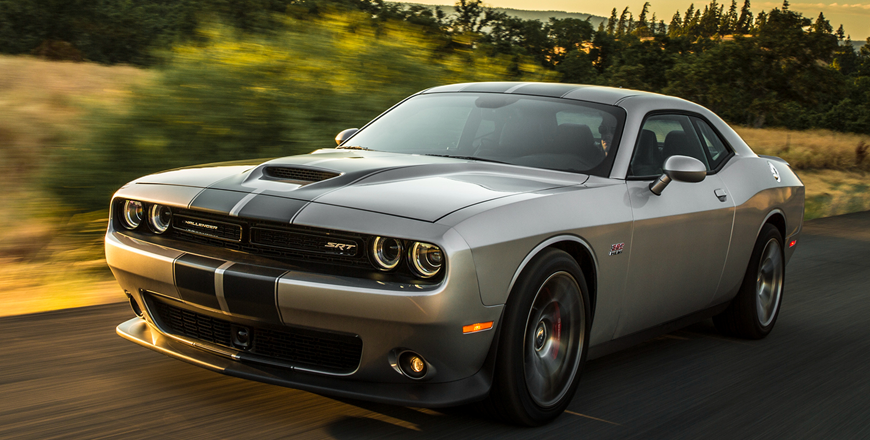You are here
Dodge Charger SRT 392: Accessible and refined brute
By Ghaith Madadha - May 02,2016 - Last updated at May 02,2016

Photo courtesy of Dodge
Part of a heavily revised Dodge Charger line-up introduced for 2015, the SRT 392 receives a slight power hike and new gearbox to go with its new look. While it may no longer be top dog in the Charger line-up, the SRT 392 is just as focused but more easily tamed, accessible and affordable to own.
With the introduction of the delightfully madcap and much celebrated world’s most powerful regular production saloon 707BHP SRT Hellcat stealing the SRT 392’s limelight, the latter becomes a somewhat junior or entry-level super saloon. However, despite incremental improvements to the SRT 392 — especially the new 8-speed gearbox — add up to considerable performance, versatility and drivability improvements.
Sculpted and dramatic
Extensively and incrementally upgraded, the Charger’s platform is based on the same Mercedes-Benz derived rear-drive independent suspension full-size saloon underpinning inherited in 2005 during the DaimlerChrysler corporate merger period. However, the latest Charger ditches its predecessors’ heavily retro-influenced design focused on a prominent crosshair grille for a more contemporary and yet more aggressive fascia.
A more aggressive take on the Charger’s facelifted design with new slim grille and rounded LED headlights and heavily browed face, the SRT 392 is a more athletic take on an already assertive design, if not quite as dramatic as the Hellcat version. Sculpted and chiselled, the SRT 392’s body is complemented with a prominent bulging air scoop, sans the Hellcat’s adjacent twin extraction vents.
Athletic and urgent, the vast 5.1-metre long Charger SRT 392 sits somewhat low at little under 1.5 metres with a rakishly slanted roofly descending down to high-set rear deck. With an undoubtedly moody and hungry appearance, with huge low-mounted and wide grille with blacked-out bumper segment, sharp front apron and rear diffuser.
Naturally responsive
Powered by Dodge’s most powerful non-supercharged V8 engine, the SRT 392’s enormous yet compactly designed cast iron block and aluminium head 6.4-litre 16-valve OHV engine is as traditional yet effective as American engines get. And while it might seem to pale next to the supercharged 6.2-litre Hellcat’s 707BHP output, it its rich, eager and thumping output is anything but modest.
With most super saloons now employing super- or turbo-charged forced induction to achieve output north of 500BHP, the SRT 392 is a welcome change and is among the last to retain natural-aspiration. Brutal yet progressive, the SRT 392 benefits from a rich yet incremental current of torque underwriting its performance, but crucially and eagerly builds to a top-end crescendo of power.
Developing a ferocious 485BHP on tap by 6000rpm and thumping 475lb/ft torque at 4200rpm and capable of 0-100km/h in roughly 4.5 seconds, the SRT 392, however, also benefits from responsive and accurate throttle response, in addition to progressive torque and power delivery. This allows one more confidence and precision when feeding power to the driven rear wheels, when cornering.
Tidy and reassuring
With its more progressive naturally aspirated engine, the SRT 392 can put power down more easily without sudden break of traction and unwanted electronic stability control overrides through corners. Meanwhile, a new slick 8-speed automatic gearbox, in place of its predecessor’s 5-speed, allows for better dispersed and closer ratios, for quicker acceleration, mid-range versatility and cruising refinement and efficiency.
Riding on double wishbone front and multi-link rear suspension, the SRT 392 rides smooth and firm yet forgiving, as tested on the Yas Marina Formula One circuit in Abu Dhabi. With quick precise 2.56-turn lock-to-lock electric-assisted steering and near-ideal 54:46 front-to-rear weighting, it turns in tidier and feels more alert that its 2-tonne weight would suggest.
Sitting in between the 5.7-litre R/T and brutal Hellcat in Dodge’s Charger model range, the SRT 392 is crisper, tidier, more connected and controlled and more engaging to drive than the former. And with more progressive delivery is easier to control and a more accessible drive than the latter, and benefits from the same huge ventilated perforated disc brakes.
Space and refinement
An accessible brute with good body control and lateral grip through corners owing to its long wheelbase and grippy 275/40ZR20 tyres, the Charger SRT 392 also features an electronic limited slip rear differential to allocate power where needed. Reassuringly stable and refined at high speed, it also felt settled and composed on rebound.
Well-insulated from noise, vibration or harshness, the SRT 392 features supportive well-adjustable and grippy Alcantara seats, and with tilt and reach contoured sports steering adjustability, one easily find a good driving position, even wearing a helmet. Spaciously comfortable inside, the Charger provides particularly good rear legroom and width, while boot space is generous at 467-litre volume.
Featuring a driver-tilted console and tasteful cabin design using good quality materials, the SRT 392 is also thoroughly well-equipped with driver assistance, convenience, safety and infotainment features. In addition to user-friendly controls, it features a 7-inch instrument display screen and intuitive 8.4-inch screen Uconnect infotainment system, from where driving modes can be accessed. An extensive list of standard and optional features also usefully includes parking assistance.
TECHNICAL SPECIFICATIONS
Engine: 6.4-litre, cast iron block/aluminium head, in-line V8 cylinders
Bore x Stroke: 103.9 x 94.5mm
Compression ratio: 10.9:1
Valve-train: 16-valve, OHV, variable valve timing
Gearbox: 8-speed automatic, rear-wheel drive, electronic limited-slip differential
Gear ratios: 1st 4.7 2nd 3.13 3rd 2.10 4th 1.67 5th 1.28 6th 1.0 7th 0.84 8th 0.67
Reverse/final drive ratios: 3.53/3.09
Power, BHP (PS) [kW]: 485 (492) [362] @6000rpm
Specific power: 75.8BHP/litre
Power-to-weight: 242.5BHP/tonne
Torque lb/ft (Nm): 475 (644) @4200rpm
Specific torque: 100.35Nm/litre
Torque-to-weight: 322Nm/tonne
Rev limit: 6400rpm
0-100km/h: approximately 4.5 seconds
Fuel consumption, city/highway: 15.7/9.4l/100km
Fuel capacity: 70 litres
Fuel requirement: 95RON
Length: 5100mm
Width: 1905mm
Height: 1480mm
Wheelbase: 3058mm
Track, F/R: 1625/1618mm
Ground clearance: 116mm
Kerb weight: 2000kg
Weight distribution, F/R: 54 per cent/46 per cent
Aerodynamic drag co-efficiency: 0.335
Headroom, F/R: 981/930mm
Legroom, F/R: 1061/1019mm
Shoulder room, F/R: 1510/1472mm
Hip room, F/R: 1428/1425mm
Cargo volume: 467 litres
Steering: Electric-assisted rack & pinion
Turning circle: 11.6 metres
Lock-to-lock: 2.56 turns
Suspension F/R: Unequal double wishbones/multi-link
Brakes, F/R: Ventilated perforated discs 390 x 34mm/350 x 28mm
Brake callipers, F/R: 6-/4 pistons
Tyres: 275/40ZR20
Related Articles
Introduced in 2015 as part of a revised Dodge Challenger coupe line-up, the SRT 392 is an evolution of the model line’s previous high perfor
The world’s most powerful regular production saloon, the Dodge Charger SRT Hellcat — and its 2-door Challenger sister — is also the most pow
As a more mainstream brand large comfortable, spacious and sporty large rear-drive saloon, the Dodge Charger is a rare but appreciated commo


















